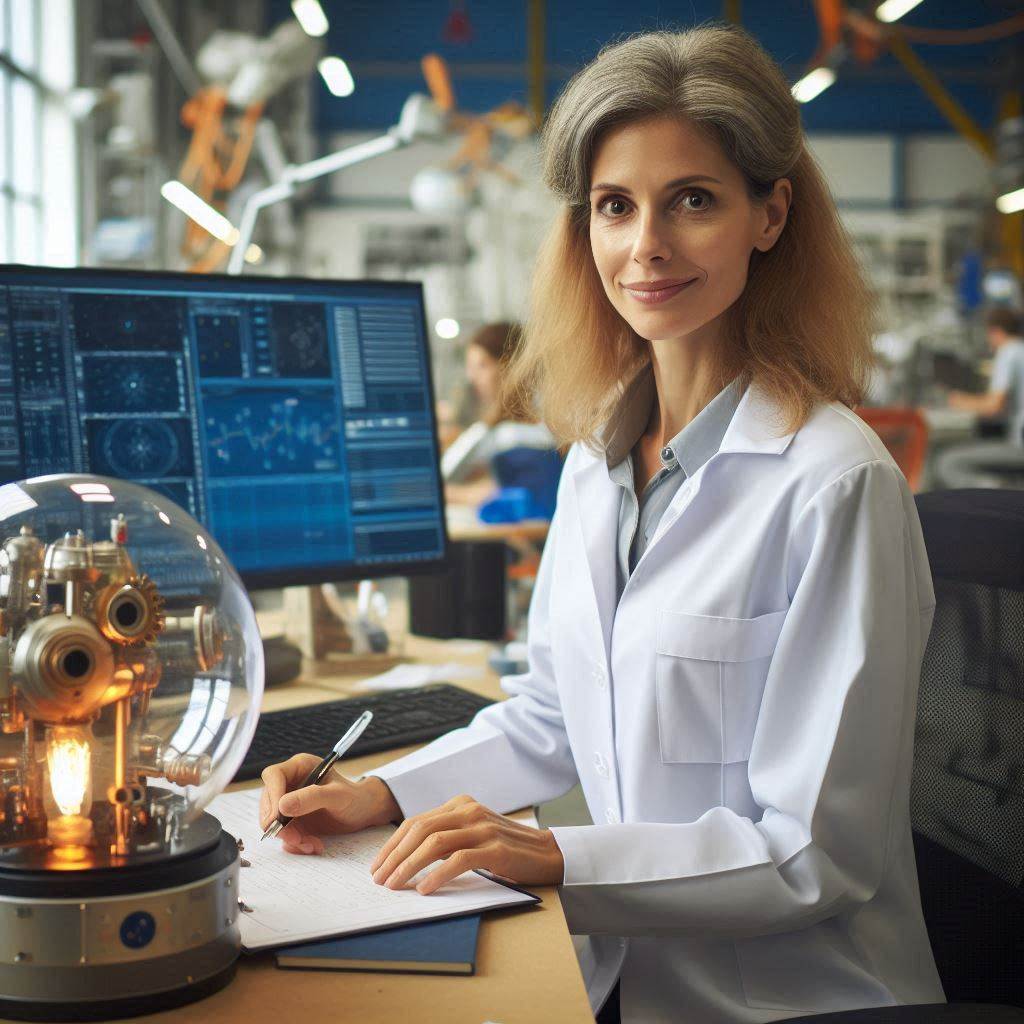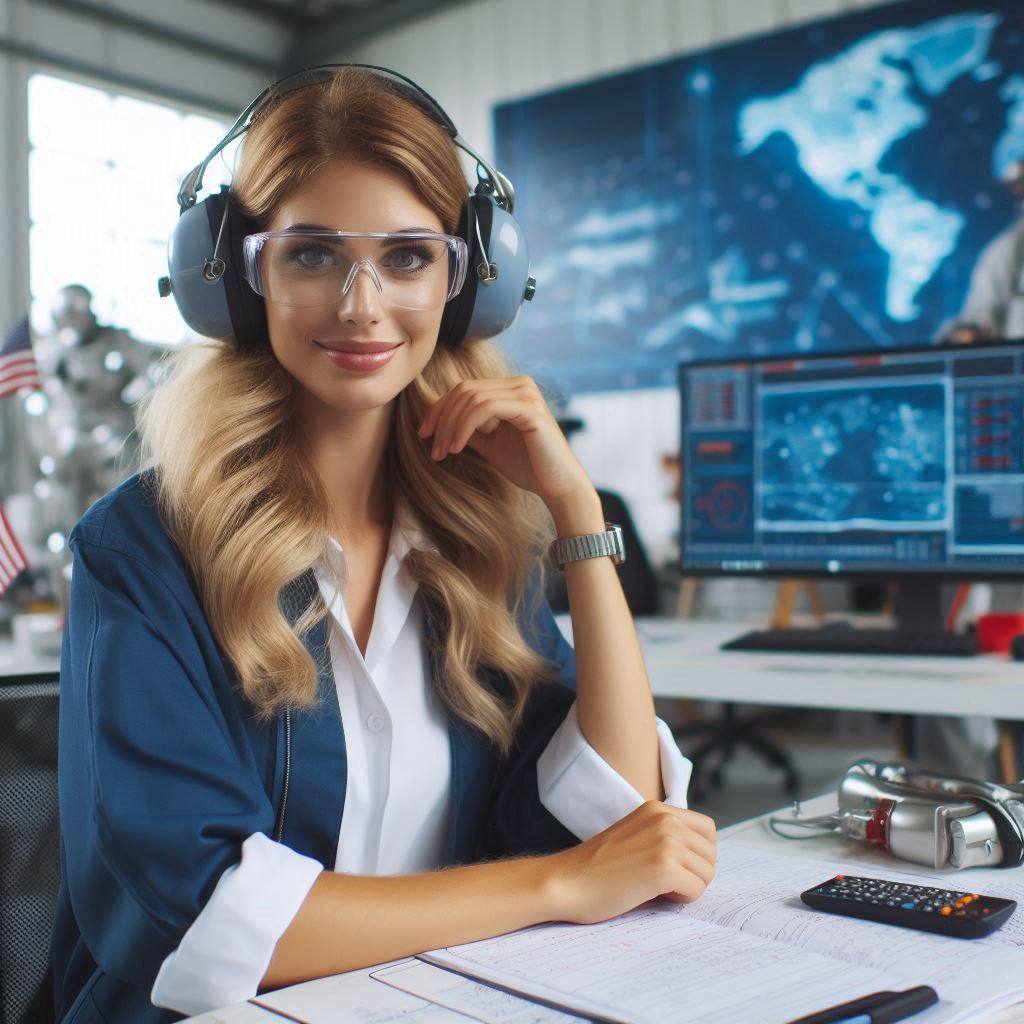Introduction
Aerospace engineering interviews are a critical step in securing a position within this competitive and specialized field.
These interviews evaluate a candidate’s technical expertise, problem-solving skills, and overall suitability for the role.
Performing well in these interviews can greatly influence career prospects and open doors to exciting opportunities in aerospace engineering.
During these interviews, candidates often encounter several common challenges.
One major hurdle is the complexity of technical questions.
Aerospace engineering requires a deep understanding of intricate concepts in aerodynamics, propulsion, and structural mechanics.
Candidates may be tested on their ability to apply these concepts to real-world problems.
Another challenge is the problem-solving scenarios presented during interviews.
Engineers must demonstrate their ability to think critically and resolve complex issues under pressure.
These scenarios often involve detailed analyses and require quick, effective solutions.
Effective communication is also a significant challenge.
Candidates need to convey their technical knowledge and experience clearly and confidently.
This includes discussing past projects, explaining technical concepts, and articulating their problem-solving approach.
Understanding these common challenges and preparing thoroughly can make a significant difference in interview performance.
It is essential for candidates to practice technical problems, review key aerospace concepts, and develop strong communication skills to navigate these interviews successfully.
Research the Company
Importance of Understanding the Company’s Mission and Values
Understanding a company’s mission and values is crucial for success in aerospace engineering interviews.
It demonstrates your genuine interest in the organization and helps you align your responses with their objectives.
Companies value candidates who not only possess technical skills but also fit well with their corporate culture and goals.
By knowing the company’s mission, you can articulate how your skills and experiences align with their strategic goals.
This understanding shows that you are motivated and committed to contributing to their success.
It also allows you to make a compelling case for why you are the right fit for their team.
How to Gather Information About the Company Before the Interview
Gathering information about the company before your interview is essential for effective preparation.
Start by visiting the company’s official website to understand their mission, values, and recent news.
Pay attention to their latest projects, technological advancements, and strategic goals.
Utilize industry news sources and journals to gather additional insights.
Look for articles or press releases about the company‘s recent achievements or challenges.
This information can provide context for your responses and demonstrate that you are well-informed about the company‘s current focus.
Networking can also be a valuable resource. Reach out to current or former employees on LinkedIn to gain insights into the company culture and work environment.
They can provide firsthand information about what it‘s like to work there and what the company values in its employees.
Tailoring Your Responses to Align with the Company’s Goals
Tailoring your responses to align with the company’s goals is crucial for making a strong impression.
When discussing your skills and experiences, focus on how they relate to the company’s mission and current projects.
Highlight examples from your past work that demonstrate your ability to contribute to their specific needs.
For example, if the company is known for its advancements in sustainable aviation technology, emphasize your experience with green technologies or related projects.
Show how your background aligns with their initiatives and how you can help them achieve their objectives.
Additionally, prepare responses to common interview questions with the company‘s goals in mind.
For instance, if asked about your strengths, choose examples that reflect qualities the company values, such as innovation, teamwork, or problem-solving.
Tailor your answers to showcase how your strengths will help the company achieve its mission.
Basically, understanding a company’s mission and values is vital for success in aerospace engineering interviews.
Gathering detailed information about the company and tailoring your responses to align with their goals will make you a more compelling candidate.
By demonstrating your knowledge and alignment with the company‘s objectives, you will increase your chances of making a positive impression and securing the position.
Prepare for Technical Questions
Brushing Up on Technical Knowledge
Brushing up on technical knowledge is crucial for success in aerospace engineering interviews.
Aerospace engineering involves complex principles of aerodynamics, propulsion, and materials science.
A strong grasp of these concepts will help you answer technical questions confidently.
Review key topics such as flight dynamics, structural mechanics, and thermal analysis.
Ensure you understand recent advancements and industry standards.
This preparation demonstrates your commitment to the field and readiness to handle technical challenges.
Practicing Sample Technical Questions
Practicing sample technical questions is an effective way to prepare for aerospace engineering interviews.
Begin by reviewing common questions related to your field.
Focus on topics like fluid dynamics, control systems, and structural analysis.
Practice solving problems under timed conditions to simulate the interview environment.
Review your answers for accuracy and completeness.
Use resources such as textbooks, online forums, and interview preparation guides.
Engaging in mock interviews with peers or mentors can also provide valuable feedback.
This practice helps you become familiar with the types of questions you might face and improves your problem-solving efficiency.
How to Demonstrate Problem-Solving Skills During the Interview
Demonstrating problem-solving skills during the interview is essential for showcasing your engineering capabilities.
Start by clearly defining the problem when presented with a scenario.
Break the problem down into smaller, manageable parts.
Use a systematic approach to address each part, outlining your thought process as you work through the solution.
Employ relevant technical knowledge and explain how you apply principles to solve the problem.
Articulate your reasoning and any assumptions you make.
This not only shows your technical expertise but also highlights your ability to think critically and analytically.
When discussing past projects or experiences, focus on specific challenges you faced and the solutions you implemented.
Describe the problem, your approach to solving it, and the outcome.
Use examples that highlight your ability to innovate, adapt, and apply your knowledge effectively.
If given a technical problem to solve during the interview, communicate your approach clearly.
Think aloud to show your problem-solving process.
If you encounter difficulties, discuss your thought process and potential solutions.
Interviewers appreciate candidates who can handle pressure and exhibit a logical approach to problem-solving.
Showcase Relevant Experience
Highlighting Past Projects and Experiences
When discussing your past projects, focus on those most relevant to aerospace engineering.
Highlight specific projects where you played a key role.
For instance, describe a project where you designed or tested an aerospace component.
Explain the objectives, your responsibilities, and the outcomes.
Detail any technical skills you applied.
If you worked on aircraft design, mention the software and tools used.
If you were involved in simulations, discuss the methods and results.
Emphasize any innovative solutions you developed or challenges you overcame.
Include metrics or tangible results whenever possible.
For example, if a project improved efficiency or reduced costs, provide specific figures.
Quantifying your impact demonstrates the value you brought to previous roles.
Connecting Previous Work to Job Requirements
Align your past experiences with the specific requirements of the job you‘re applying for.
Review the job description carefully and identify key skills and qualifications needed.
Connect your past projects and achievements to these requirements.
Transform Your Career Today
Unlock a personalized career strategy that drives real results. Get tailored advice and a roadmap designed just for you.
Start NowFor example, if the job emphasizes experience with CAD software, highlight your experience with similar tools.
Discuss how your skills in using CAD software led to successful design outcomes.
Relate your project experience to the job‘s technical needs.
If the position requires strong teamwork, describe instances where you collaborated effectively.
Highlight any leadership roles you took or how you contributed to team success.
Relate these experiences to the job‘s collaborative environment.
Effectively Communicating Your Accomplishments
When communicating your accomplishments, be clear and concise.
Focus on the most relevant details that align with the job‘s requirements.
Use the STAR method (Situation, Task, Action, Result) to structure your responses, making your achievements easy to follow.
Start with a brief overview of the project or task. Then, explain your role and actions in a straightforward manner.
Conclude with the results and impact of your work.
Avoid overloading the interviewer with excessive details; instead, provide a clear summary.
Practice summarizing your accomplishments in a few sentences.
This will help you deliver concise and impactful responses during the interview.
Focus on the key achievements and their relevance to the role.
Highlighting past projects and experiences in aerospace engineering interviews requires a strategic approach.
Emphasize relevant projects, connect your work to the job requirements, and communicate your accomplishments concisely.
By aligning your past experiences with the role‘s needs and presenting them clearly, you demonstrate your suitability for the position and enhance your chances of success.
Demonstrate Soft Skills
When interviewing for a position in aerospace engineering, technical skills are undoubtedly important, but soft skills play a crucial role as well.
Employers are looking for candidates who not only have the technical know-how but also possess strong communication, teamwork, leadership, adaptability, and willingness to learn new technologies.
Importance of showcasing communication and teamwork skills
Communication and teamwork are essential skills in any engineering field, including aerospace.
When discussing your experience in engineering projects, be sure to highlight instances where you effectively communicated with team members, clients, and other stakeholders.
Emphasize your ability to work collaboratively in a team environment and how you contributed to the success of a project through effective communication.
How to talk about your leadership abilities in engineering projects
Leadership skills are highly valued in aerospace engineering roles.
When discussing your leadership abilities, provide specific examples of how you took initiative, motivated team members, and successfully led engineering projects to completion.
Highlight your problem-solving skills, decision-making abilities, and how you managed challenges and conflicts within a team setting.
Showing adaptability and willingness to learn new technologies
In a field as dynamic as aerospace engineering, it’s important to demonstrate your ability to adapt to new technologies and methodologies.
Showcase your willingness to learn and embrace new technologies by discussing instances where you quickly learned and applied new tools or techniques in your work.
Highlight your flexibility in adapting to changing project requirements and your proactive approach to staying updated with industry trends.
In essence, soft skills are just as important as technical skills in succeeding in aerospace engineering interviews.
By showcasing your communication, teamwork, leadership, adaptability, and willingness to learn new technologies.
You can differentiate yourself as a well-rounded candidate who is not only proficient in engineering but also equipped with the essential skills to excel in a collaborative and dynamic aerospace engineering environment.
Read: How to Become a Civil Rights Advocate
Prepare Questions for the Interviewer
Importance of asking thoughtful questions about the company and the role
When preparing for an aerospace engineering interview, it’s crucial not only to be ready to answer questions but also to have questions of your own for the interviewer.
This shows your interest in the company, the role, and your dedication to your field.
Asking thoughtful questions can leave a lasting impression on the interviewer and set you apart from other candidates.
It also gives you valuable insight into whether the company and the role align with your career goals and values.
Examples of questions to ask about the team and company culture
- Can you tell me more about the team I will be working with?
- How would you describe the company culture?
- What opportunities are there for professional development?
- How does the company support work-life balance?
These questions not only demonstrate your interest in the company but also help you assess whether it is the right fit for you.
Remember, interviews are a two-way street, and it’s essential to gather as much information as possible to make an informed decision.
How to use questions to demonstrate your interest and knowledge
Asking questions that showcase your knowledge of the aerospace industry can help you stand out during the interview.
Consider asking about recent industry trends, projects the company is working on, or how they see the future of the industry evolving.
By demonstrating your understanding of the field and your enthusiasm for it, you show the interviewer that you are not just looking for any job but are genuinely interested in contributing to the aerospace industry in a meaningful way.
Remember to tailor your questions to the specific company and role you are interviewing for.
By doing so, you can show that you have done your research and are serious about pursuing a career in aerospace engineering.
Overall, preparing questions for the interviewer is an essential part of any aerospace engineering interview.
It allows you to gather valuable information, demonstrate your interest and knowledge, and leave a positive impression on the interviewer.
So, make sure to come prepared with thoughtful questions that show your dedication to your field.
Showcase Your Business Today
Reach thousands of readers actively exploring professional services. Publish your business profile and grow your audience now.
Publish NowRead: Impact of Local Building Codes on US Architecture.
Practice Behavioral Questions
Behavioral interview questions assess how you handle various situations based on past experiences.
In aerospace engineering, these questions often focus on problem-solving, communication, and collaboration.
Understanding how to effectively answer these questions is crucial for success.
Overview of Common Behavioral Interview Questions
Behavioral questions in aerospace engineering interviews often include scenarios involving project challenges, team dynamics, and problem-solving situations.
Examples might include
- “Describe a time when you faced a significant technical challenge. How did you overcome it?”
- “Tell me about a situation where you had to work closely with a difficult team member.”
- “Give an example of how you managed a project under tight deadlines.”
These questions aim to uncover how you handle real-world issues and work within a team.
How to Structure Your Responses Using the STAR Method
The STAR method is an effective way to structure your responses to behavioral questions.
STAR stands for Situation, Task, Action, and Result.
Follow these steps to craft a compelling answer
- Situation: Start by describing the context or background of the scenario. Be concise and set the stage for your story.
- Task: Explain the specific task or challenge you faced. Clarify your role and the objective you needed to achieve.
- Action: Detail the actions you took to address the task. Focus on your thought process and the steps you implemented.
- Result: Conclude with the outcome of your actions. Highlight the positive results and any lessons learned.
Using STAR helps you present clear and structured responses, showcasing your problem-solving and decision-making abilities.
Demonstrating Key Competencies
When answering behavioral questions, emphasize key competencies essential for aerospace engineering roles
- Problem-Solving: Demonstrate how you approach and resolve technical challenges. Provide examples where your analytical skills led to successful outcomes. Highlight any innovative solutions you developed.
- Communication: Show your ability to convey complex information clearly. Discuss instances where effective communication helped you collaborate with team members or stakeholders. Emphasize how you ensured all parties understood project goals and updates.
- Collaboration: Illustrate your teamwork skills by describing how you worked with others to achieve project objectives. Mention any experiences where you coordinated with cross-functional teams or managed conflicts within the team. Highlight your ability to contribute positively to group dynamics.
By focusing on these competencies, you show that you are not only technically skilled but also capable of working effectively in a team-oriented environment.
Preparing for behavioral interview questions involves understanding common scenarios, structuring responses with the STAR method, and demonstrating essential competencies.
Aerospace engineering interviews assess how you handle real-world challenges, communicate effectively, and collaborate with others.
By providing structured, competency-focused answers, you position yourself as a strong candidate capable of thriving in aerospace engineering roles.
Read: Freelance vs. Firm: Career Paths for US Architects

Uncover the Details: Skills Required for a Successful DBA Career
Dress and Behave Professionally
Importance of Dressing Appropriately for the Interview
Dressing appropriately for an aerospace engineering interview is crucial for making a strong first impression.
Your attire should reflect professionalism and attention to detail.
Opt for a well-fitted suit in neutral colors like navy, black, or gray. Ensure your clothing is clean, pressed, and free of wrinkles.
For men, a dress shirt, tie, and polished shoes complete the look.
Women should choose a professional dress or a blouse with tailored pants or a skirt.
Avoid flashy accessories or overly casual clothing.
Dressing appropriately shows respect for the interview process and demonstrates that you take the opportunity seriously.
Tips on Body Language and Demeanor During the Interview
Body language and demeanor significantly impact how you are perceived during the interview.
Maintain good posture by sitting up straight and avoiding slouching.
This posture conveys confidence and attentiveness.
Make consistent eye contact with the interviewer to show engagement and honesty.
Smile naturally and nod occasionally to show that you are actively listening.
Avoid crossing your arms, as it can appear defensive or closed off.
Use hand gestures sparingly to emphasize key points without being distracting.
Keep your movements controlled and calm to project professionalism.
How to Make a Positive First Impression on the Interviewer
Making a positive first impression starts with your arrival at the interview.
Arrive on time, ideally 10-15 minutes early. Greet the interviewer with a firm handshake and a warm smile.
Introduce yourself clearly and confidently.
Prepare by researching the company and the role beforehand.
Demonstrating knowledge about the organization shows that you are genuinely interested and well-prepared.
During the interview, articulate your answers clearly and concisely.
Highlight your relevant skills and experiences while aligning them with the company’s needs.
Express enthusiasm for the role and the field of aerospace engineering.
Enthusiasm and a genuine interest can make you stand out from other candidates.
In review, thank the interviewer for the opportunity and reiterate your interest in the position.
Follow up with a thank-you email within 24 hours to reinforce your appreciation and interest.
Read: The Intersection: Architecture & Tech in Modern USA.
Follow Up After the Interview
Importance of Sending a Thank-You Note or Email
Sending a thank-you note or email after an aerospace engineering interview is crucial.
It demonstrates your appreciation for the opportunity and shows your professionalism.
A well-crafted thank-you note reinforces a positive impression and helps you stand out from other candidates.
This gesture reflects your enthusiasm for the position and respect for the interviewer‘s time.
It also provides a chance to reiterate key points discussed during the interview and remind the employer of your qualifications.
Promptly sending a thank-you note, ideally within 24 hours, highlights your commitment and reinforces your interest in the role.
Tips for Expressing Gratitude and Reiterating Your Interest
When crafting your thank-you note, start by expressing sincere gratitude for the interview opportunity.
Thank the interviewer for their time and insights into the role and company.
Mention specific aspects of the interview that you found particularly engaging or insightful.
This personalized touch demonstrates that you were actively listening and are genuinely interested in the position.
Reiterate your enthusiasm for the role and briefly summarize why you are a strong fit.
Highlight any unique qualifications or experiences discussed during the interview that align with the job requirements.
Ensure your message is concise, clear, and free of errors.
How to Follow Up on the Status of Your Application
Following up on the status of your application is important but requires a delicate approach.
Wait at least one to two weeks after sending your thank-you note before reaching out.
This allows the hiring team sufficient time to review applications and make decisions.
When you do follow up, be polite and professional.
Begin your message by thanking the interviewer once again and express your continued interest in the position.
Politely inquire about the timeline for a decision or any next steps in the hiring process.
Avoid being overly persistent or demanding. A brief and courteous follow-up email demonstrates your enthusiasm without coming across as pushy.
Sending a thank-you note after an aerospace engineering interview is a crucial step in the job application process.
It shows appreciation and reinforces your interest in the position.
Express gratitude and reiterate your fit for the role by highlighting specific points from the interview.
When following up on your application status, wait a reasonable period and maintain a polite and professional tone.
Effective communication during this phase of the interview process can enhance your candidacy and leave a lasting positive impression.
By following these tips, you can successfully navigate the post-interview stage and improve your chances of securing the job.
Conclusion
To excel in aerospace engineering interviews, it‘s essential to focus on several key strategies.
First, thoroughly research the company and its projects.
Understand their recent advancements, core values, and the specific requirements of the role you‘re applying for.
This knowledge will help you tailor your responses and demonstrate a genuine interest in the company.
Second, prepare for both technical and behavioral questions.
Review fundamental aerospace engineering concepts and be ready to discuss your past projects and experiences.
Practice solving engineering problems and explaining your thought process clearly.
Mock interviews can be particularly helpful in refining your answers and improving your performance.
Third, ensure your resume and cover letter are tailored to the aerospace industry.
Highlight relevant skills, experiences, and achievements that align with the job description.
Being specific about your accomplishments can make your application stand out.
It‘s also important to practice good interview etiquette.
Dress professionally, arrive on time, and be polite to everyone you encounter.
During the interview, actively listen to the questions and respond thoughtfully.
Show enthusiasm for the role and the field of aerospace engineering.
[E-Books for Sale]
The Big Book of 500 High-Paying Jobs in America: Unlock Your Earning Potential
$19.99 • 500 High-Paying Jobs • 330 pages
Explore 500 high-paying jobs in America and learn how to boost your career, earn more, and achieve success!
See All 500 High-Paying Jobs of this E-Book
1001 Professions Without a Degree: High-Paying American Jobs You Can Start Now
$19.99 • 1001 Professions Without a Degree • 174 pages
Discover 1001 high-paying jobs without a degree! Unlock career tips, skills, and success strategies for just $19.99!




